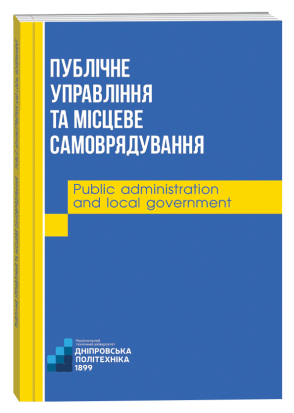CONCEPTUAL PRINCIPLES OF DETERMINING THE PHENOMENON OF CAPACITY IN THE MODERN METHODOLOGY OF PUBLIC ADMINISTRATION
DOI:
https://doi.org/10.32782/2414-4436/2023-2-2Keywords:
institute, institution, institutial capacity, institutional capacity, public administration, research methodology, theory of institutionalism.Abstract
Purpose. The purpose of this work is to conceptualize the main parameters of the notions of institutial and institutional capacity, as well as to specify the methodological foundations of the study of these attributes of institutional phenomena in the science of public administration. Actuality. The concept of institutial/institutional capacity is quite widely used by Ukrainian scientists to study the peculiarities of the functioning institutions of the political system of society. However, in most publications, this analytical category is used as a matter of course, without a detailed consideration of its content and semantic differentiation, with a focus on primarily applied aspects of measurement. In order to solve this problem, the layer of existing developments on the issues of public administration should be supplemented with the methodological basis of political analysis, which will allow expanding the epistemological guidelines of scientific research. Results. As a result of the research, it was established that the institutial capacity should be understood as the capacity of the institute to regulate a certain type of social relations based on the norms of international legal acts recognized by the state, national legislation and social legitimation (normative aspect of the institute essence). Institutional capacity can be defined for an institution as the ability to perform its functions on the basis of regulatory, organizational and resource provision (structural aspect of the institution's essence). Conclusion. Thus, it was found that the analysis of the specified components of institutial capacity can be implemented based on the application of the research directions provisions of the new institutionalism of political science: international institutionalism, normative institutionalism and sociological institutionalism; and institutional capacity – based on the application of the research directions provisions of institutional studies in economics and political science and the new institutionalism of political science: classical (old) institutionalism, structural institutionalism and economic institutionalism.
References
Abrutyn S., Turner J. H. The Old Institutionalism Meets The New Institutionalism. Sociological Perspectives. 2011. № 54(3). Р. 283-306. URL: https://open.library.ubc.ca/media/stream/pdf/52383/1.0371631/5
Bodnieks, V. The New Institutionalism: A tool for analysing defence and security institutions. Security and Defence Quarterly. 2020. № 32(5). Р. 83-94. DOI: https://doi.org/10.35467/sdq/130903
Cazorla M., Gallego-Bono J. R. Approaches to Economic Institutionalism: A Theoretical Review of its Characteristics and Elements of Study. Academic Journal of Interdisciplinary Studies. 2023. № 12. Р. -66. DOI: 10.36941/ajis-2023-0060.
Dimitriu M. Approach To The Structural Institutionalism. Journal of Financial and Monetary Economics. 2015. vol. 2(1). P. 179-182.
Hoefer R. Institutionalism as a Theory for Understanding Policy Creation: an Underused Resource. Journal of Political Practice & Research. 2022. № 3. Р. 71–76. DOI: https://doi.org/10.1007/s42972-022
March J.G., Olsen, J.P. Elaborating the “New Institutionalism”. Working Paper. 2005. № 11. 28 p.
March J.G., Olsen, J.P. Rediscovering Institutions. N.-Y. : Free Press. 1989. 237 p.
March J.G., Olsen, J.P. The logic of appropriateness. Working Paper. 2009. № 4. 28 р.
Porumbescu А. Sociological institutionalism arguments in explaining EU integration. Sociology and Social Work Review. 2018. № 2. Р. 17-24. https://globalresearchpublishing.com/wp-content/uploads/2018/12/ Sociological-institutionalism-arguments-in-explaining-EU-integration.pdf
Veitch S., Christodoulidis E., Goldoni M. Legal institutionalism. URL: https://www.taylorfrancis.com/ chapters/edit/10.4324/9781315795997-26/legal-institutionalism-scott-veitch-emilios-christodoulidis-marcogoldoni
Баштанник О. В. Особливості наукового дослідження в рамках класичного інституціоналізму політико-інституційної парадигми. Науково-теоретичний альманах Грані. 2014. № 3. С. 87-93.
Баштанник О. Соціологічний інституціоналізм як напрям нового інституціоналізму політичної науки: методологія та її реалізація в українських політологічних дослідженнях. Науково-теоретичний альманах Грані. 2020. № 23(9). С. 5-14. https://doi.org/10.15421/172080 13. Демчищак Р. Наукові підходи до розуміння сутності поняття “політичний інститут”. Українська національна ідея: реалії та перспективи розвитку. 2015. № 27. С. 9-14.
Кармазіна М., Шурбована О. “Інститут” та “інституція”: проблема розрізнення понять. Політичний менеджмент. 2006. № 4. С. 10-19. 15. Колісніченко Н., Войновський М. Інституційна та інституціональна спроможність місцевого самоврядування: сутність понять та особливості визначення. Теоретичні та прикладні питання державотворення. 2015. Вип. 16. С. 296-309.
Макух О. Комунікативний підхід до дослідження політики: методологічний аналіз. Вісник Львівського університету. Серія філософсько-політологічні студії. 2012. Вип. 2. С. 122-128.
Михальченко М. Цивілізаційний аналіз як засіб політичного пізнання. Наукові записки Інституту політичних і етнонаціональних досліджень ім. І. Ф. Кураса НАН України. 2017. Вип. 4. С. 5-19.
Обушна Н. І. Особливості категоріального апарату інституціональної теорії у площині державного управління. Менеджер. Вісник Донецького державного університету управління. 2016. № 1. С. 40-48.
Про національну безпеку України : Закон України від 21.06.2018 № 2469-VIII : станом на 31 берез. 2023 р. URL: https://zakon.rada.gov.ua/laws/show/2469-19#Text (дата звернення: 21.08.2023)
Романюк А. Новий інституціоналізм та поняття інституту в політичній науці. Вісник Львівського університету. Серія філософські науки. 2006. Вип. 9. С. 190-199.
Романюк А. Основні етапи розвитку політичної думки у XX ст. Вісник Львівського університету. Серія філософсько-політологічні студії. 2011. Вип. 1. С. 87-96.
Рось О. Г. Поняття та сутність нормативно-правового забезпечення інституційної спроможності представницьких органів місцевого самоврядування. Інвестиції: практика та досвід. 2019. № 18. С. 97-100. DOI: 10.32702/23066814.2019.18.97
Стойко О. М. Структурні теорії інституційних змін. Держава і право. 2009. Вип. 46. С. 578-581.
Стойко О. М. Трансформація політичних інститутів у сучасних перехідних суспільствах. Київ: Ін-т держави і права ім. В.М. Корецького НАН України; “Логос”, 2016. 416 с.
Хаустова В. Є., Омаров Ш. А. О. Концепція сталого розвитку як парадигма розвитку суспільства. Проблеми економіки. 2018. № 1. С. 265-273.






